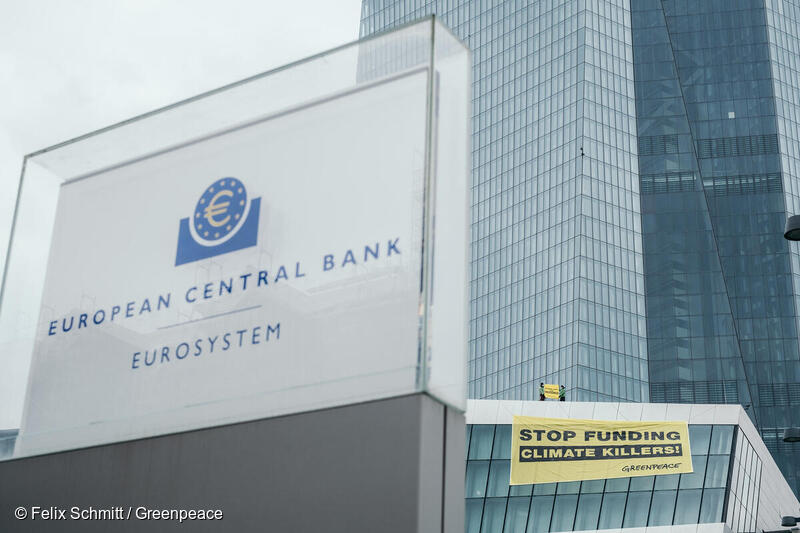Refusal to align policies with climate action could expose central banks to legal challenges

Brussels/Frankfurt, 18 June 2021 – A new legal analysis [1] commissioned by Greenpeace Germany revealed that Europe’s central banks are obliged to take climate action and include climate criteria in monetary policy. The study, Legal Options for Implementing Climate Criteria in the Monetary Policy of the European Central Bank, issued ahead of the European Central Bank’s (ECB) governing council’s unofficial weekend retreat on climate change, found that climate protection is not optional for the European System of Central Banks (ESCB).
Refusing to align policies with climate action could also expose central banks to legal challenges, according to the analysis.
Climate protection is not only a human right, the study shows, but also a fundamental principle of the European Union, its member states and its institutions. European central banks are bound by the principle.
The author of the study is German lawyer Roda Verheyen, who played a leading role in a case, co-initiated by Greenpeace Germany, resulting in a ruling by the German Constitutional Court forcing the German government to bring its climate law in line with the Paris climate agreement.
“Critics of a green monetary policy like to claim that climate protection does not fall within the European Central Bank’s mandate – this reading is obviously wrong,” said Dr Mauricio Vargas, Greenpeace financial expert. “The law is clear: climate protection is a human right and all state bodies, including the Bundesbank, are obliged to enforce this right. Using the bank’s independence as an excuse for a monetary policy that is demonstrably extremely damaging to the climate is no longer acceptable.”
The report derives the obligation for the ESCB to take climate action from several European treaties. This obligation is not affected by the institutional independence of central banks. The Paris Agreement also provides a binding framework under international law. It emphasises the role of finance and investments, and explicitly demands that financial flows be redirected to support climate resilience. Lastly, the ruling by the German Constitutional Court obliges the Bundesbank to examine its discretionary powers in order to enforce its obligation to protect the climate, which is enshrined in the German constitution (Art 20a).
“The ECB is an EU institution and as such is bound by the requirements of EU treaties. Clearly, this means it must also support EU policies on sustainable development and environmental protection. Since climate protection is a human right, it must also do what it can to respect the EU Charter of Fundamental Rights,” said Roda Verheyen.
The legal analysis also raises the question of whether central banks like the Bundesbank are making themselves vulnerable to legal challenges because they have so far failed to bring their monetary policy in line with political efforts to protect the climate.
Greenpeace calls for a new monetary policy strategy from the ECB and the Bundesbank that is credibly aligned with the goals of the Paris Agreement [2]. The ECB is due to present a new monetary strategy in autumn 2021.
-ends-
Notes:
[1] Legal opinion: Legal Options for Implementing Climate Criteria in the Monetary Policy of the European Central Bank.
[2] In a report published in March 2021, Greenpeace and four research institutes revealed how the rules governing which assets private banks can provide to the ECB as collateral when borrowing money favour fossil fuel companies. The analysis offered three alternative scenarios that the ECB could adopt to support the transition to renewable energy and to tackle the climate emergency, helping it to align with the Paris climate agreement.
Contacts:
Mauricio Vargas – Greenpeace Germany financial expert: +49 151 11765567, [email protected]
Mihaela Bogeljić – Greenpeace Central and Eastern Europe communications: +385 92 2929 265, [email protected]
For breaking news and comment on EU affairs: www.twitter.com/GreenpeaceEU
Greenpeace is an independent global campaigning organisation that acts to change attitudes and behaviour, to protect and conserve the environment and to promote peace. We do not accept donations from governments, the EU, businesses or political parties. We have over three million supporters, and offices in more than 55 countries.
EU Transparency Register: 9832909575-41
